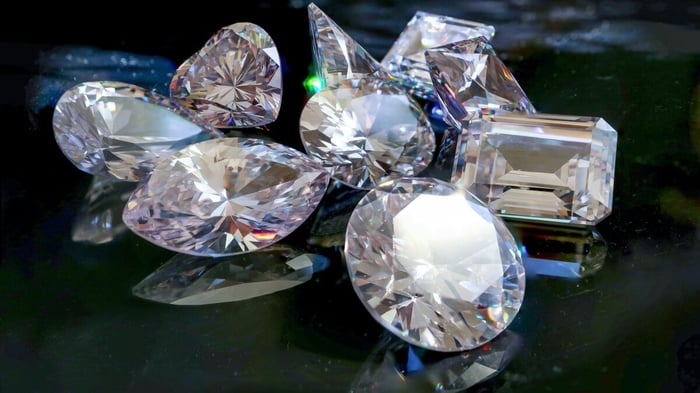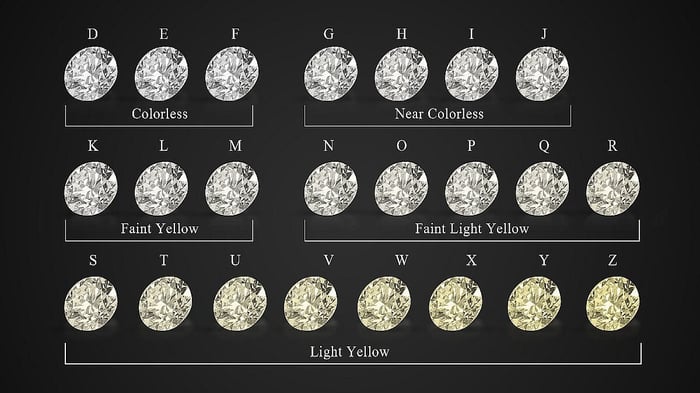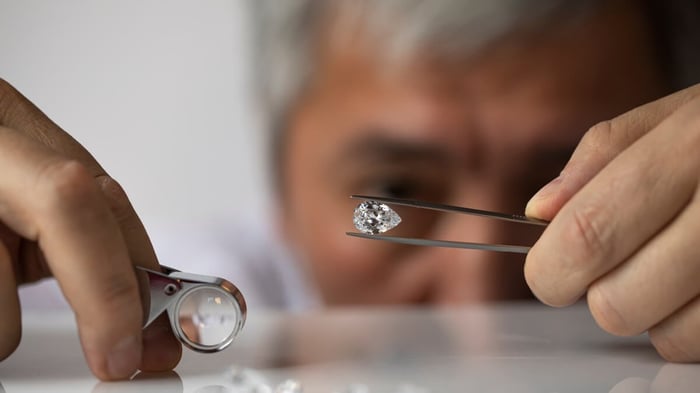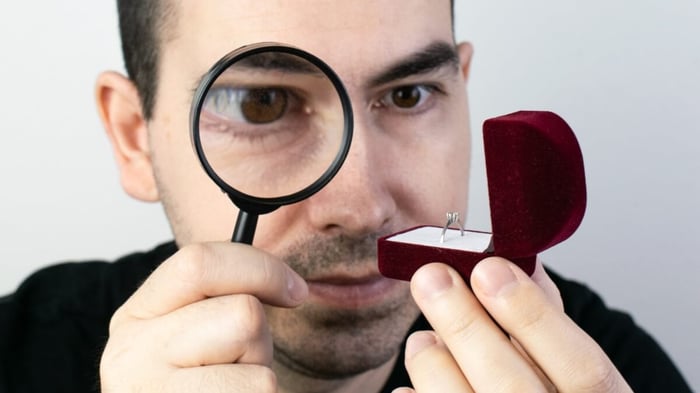The Shapes Of Your Diamond Jewellery – It's All In The Diamond Cut!
Diamonds in the rough look nothing special; they are ugly grey pebbles. If you were to see a rough diamond on the ground, you would ignore it unless you knew exactly what to look out for. However, the transition is quite amazing when these ordinary-looking stones are cut into the forms we are accustomed to in diamond jewellery. The skill of diamond cutters and polishers makes unassuming pebbles into the things of beauty we love to use in jewellery.
The brilliance, fire, and colour of diamonds are enhanced by cutting. Diamond cutting is a highly skilled process that can take many years to master fully.
The different shapes of diamonds are, somewhat confusingly, referred to as diamond cuts. This article will look at some of the diamond cuts you will likely see in fine diamond jewellery.
The Diamond Cuts Most Often Seen In Fine Diamond Jewellery
Most diamonds, over 70% in the United Kingdom, are cut into round shapes (round brilliant cut). All other cuts (shapes) are called 'fancy cuts.'
The baguette (similar to a French loaf of bread), the marquise, the princess (square), the briolette (rose cut), and the pear cut are all examples of fancy cuts.
Newer cuts are being brought into the sector today. The 'cushion', 'radiant' (similar to princess cuts but with rounded corners), and 'Asscher' cuts are among them (square emerald cut). In many cases, these cuts take advantage of advances in diamond cutting technology that enable diamonds to have more facets cut, increasing the sparkle and brilliance of the diamond.
As a side note, you may see references to 'fancy coloured' diamonds. These are any colour of diamond than the customary white or clear diamond.
Marcel Tolkowsky, a mathematician and gem aficionado, established the ideal mathematical ratios of angles and proportions of a diamond's facets that would enable a diamond to be cut to maximise its brilliance and sparkle. As a result of his work, many round brilliant diamonds cut and polished today are much brighter than similarly shaped diamonds cut earlier in the 20th century.
2.00ct Baguette and Round Cut Claw Set Diamond Cross in 18k White Gold

€3.479,95
Indulge her with a surprise with this sparkling diamond cross pendant. Crafted in 18k white gold, this cross design diamond pendant features channel set baguette diamonds framed by round brilliant micro-set diamonds with a stunning claw set round brilliant cut… read more
Fashion And Diamond Shapes
Like any other man-made decoration, diamonds are greatly affected by current trends. The baguette (which emphasises a diamond's shine while reducing its fire) was popular throughout the Art Deco period.
The princess cut is becoming more fashionable nowadays, especially among younger ladies. It's a popular choice among diamond cutters since it preserves the majority of the original stone's crystal.
Diamond cuts have been modified over the decades. These new cuts appear to be more concerned with attempting to adapt a brand differentiator than with meaningful improvements. This trend is shown by the fact that many modern branded diamond cuts are trademarked and patented, making them exclusively available to a particular jeweller or brand. These cuts are often sold at a higher price than usual for a diamond of similar quality and shape.
Don't worry too much about this aspect of diamond shapes. Where a new, branded cut adds real value to the diamond, there are often close alternatives that are freely available at a lower cost.
Diamond Shapes (Cuts) To Look Out For
In today's world, the round diamond is the most popular. It has 57 facets (or 58, including the culet). It has the most fire and scintillation of any cut, which is why it is so popular. The round brilliant cut is the shape that most of us think of as the classic diamond shape.
The princess cut, which is cut into a square with a 90-degree angle on each corner, produces a vast amount of brightness, second only to the round. This cut gives the impression of a larger diamond than a round brilliant cut of the same carat weight! Many diamond lovers chose the princess cut because it has a slightly lower profile than the round brilliant cut – giving a slightly larger visual appearance when looked at from the top.
The most emotional gems are heart-shaped diamonds. They are challenging to cut. It's also the most difficult to come by. If you are planning to buy a heart-shaped diamond, check that the gemstone has perfect symmetry. If the left/right symmetry is even slightly off, one lobe of the heart will look larger than the other giving an odd appearance.
Rectangular diamonds with rounded sides are known as radiant diamonds. The patterns of the facets, which resemble fractured ice, give it a unique appearance.
The oval diamond, invented in the 1960s, is comparable to the round brilliant except for its ovate form. On top, there is a noticeable "bow-tie." In an oval diamond, the bow-tie is an expected feature. When the same effect is seen in a round diamond, it detracts from the value.
Oval Halo Diamond Earrings 0.60ct G/SI Quality in 18k White Gold

€1.321,95
This pair of sparkling clusters of precious diamonds will be a fantastic finishing touch to the most sophisticated outfits. 0.60ct of G/SI quality diamonds, crafted in the UK by our skilled craftsmen, ensure an eye-catching result for these classic halo… read more
The Asscher, which was created in 1902, is also known as the square emerald cut. It features cropped corners that provide a touch of sophistication. The Asscher cut was the first cut to be patented. Today the cut is out of patent and can be purchased from many jewellers. However, modified versions of the Ascher are still under patent.
The emerald cut is named for the traditional shape of the green gemstone. It has a traditional beauty due to its window-like transparency. Bevelled corners characterise the emerald cut, whether rectangular or square. Because it has few facets, it was possible to cut with the basic equipment available to diamond cutters hundreds of years ago. This shape does not have a high degree of sparkle due to the low facet count, but it has a beautiful brilliance and shimmer that sets it apart from many more modern cuts.
The marquise is elongated with pointy ends and contains 56 facets. It was said to have been inspired by the Marquise de Pompadour's grin and was designed for Louis XIV of France. The Marquise de Pompadour was the emperor's mistress.
The pear shape resembles a teardrop. It hangs beautifully from the earlobes. It looks best as a necklace or a pair of earrings. Sometimes the pear shape is used in rings to emphasise the length of the wearer's finger.
The cushion cut, also known as the candlelight cut, features more prominent facets and rounded edges to enhance the glitter of the stone when lit by candlelight.
A triangular diamond's corners might be sharp or rounded. The body form and proportions are determined by the cutter's assessment of the qualities of the stone.
Pear Halo Diamond Engagement Ring with 0.30ct in 18k White Gold

€911,95
A brilliant combination of beautiful white gold and a brilliant cut diamond, this engagement ring is a must-have for any woman celebrating her love. The ring features a dazzling halo of diamonds around the centre diamond for extra sparkle. The… read more
The different cuts of diamond jewellery are all aimed to showcase the stone's brilliance. Each shape has its distinct elegance and advantages.
Which do you think might look best on your next piece of fine diamond jewellery?
All Diamond Cuts For You
At All Diamond, our most popular diamond cut is the round brilliant. We can understand why! At the same time, our designers and artisans have used several different diamond shapes to create our collections of fine diamond jewellery.
Whether you want to choose the most popular diamond cut or take your own path to jewellery nirvana, we have something for you! No matter what you choose, you can be sure that you made the right choice because we offer a 30 day return and exchange period so you can see that your choice was the right one - or change your mind!
You can browse our collections of British designed and handcrafted diamond jewellery by clicking HERE!




